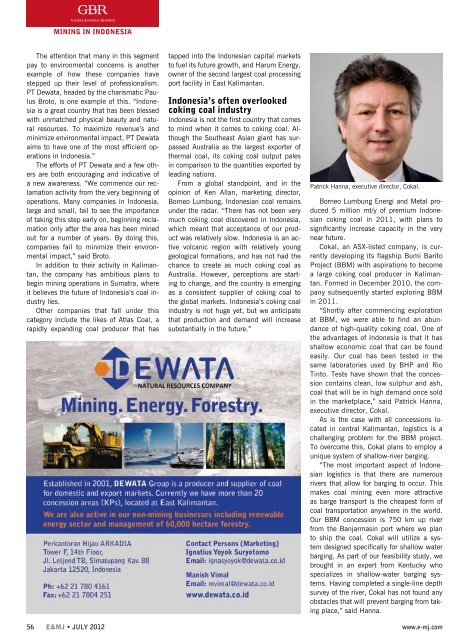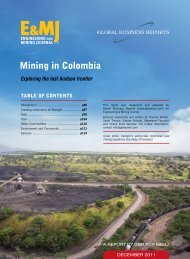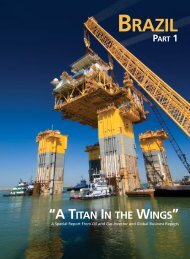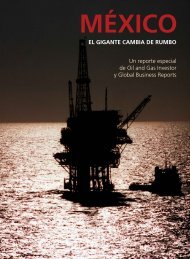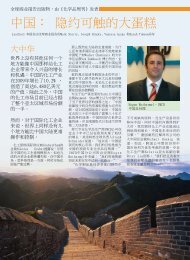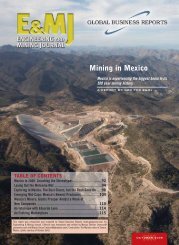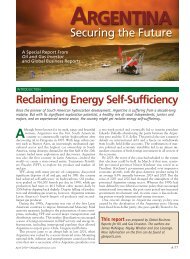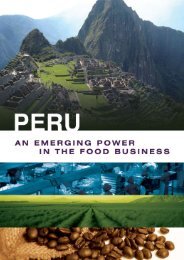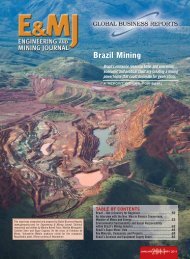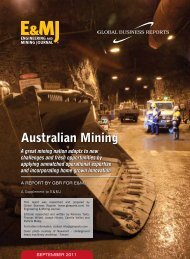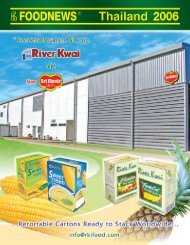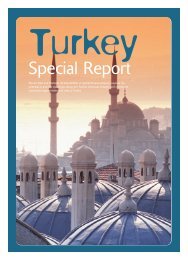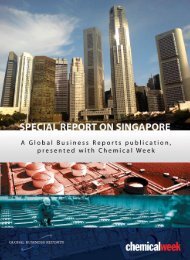Indonesia Mining 2012 - GBR
Indonesia Mining 2012 - GBR
Indonesia Mining 2012 - GBR
Create successful ePaper yourself
Turn your PDF publications into a flip-book with our unique Google optimized e-Paper software.
<strong>Mining</strong> IN <strong>Indonesia</strong><br />
The attention that many in this segment<br />
pay to environmental concerns is another<br />
example of how these companies have<br />
stepped up their level of professionalism.<br />
PT Dewata, headed by the charismatic Paulus<br />
Broto, is one example of this. “<strong>Indonesia</strong><br />
is a great country that has been blessed<br />
with unmatched physical beauty and natural<br />
resources. To maximize revenue’s and<br />
minimize environmental impact, PT Dewata<br />
aims to have one of the most efficient operations<br />
in <strong>Indonesia</strong>.”<br />
The efforts of PT Dewata and a few others<br />
are both encouraging and indicative of<br />
a new awareness. “We commence our reclamation<br />
activity from the very beginning of<br />
operations. Many companies in <strong>Indonesia</strong>,<br />
large and small, fail to see the importance<br />
of taking this step early on, beginning reclamation<br />
only after the area has been mined<br />
out for a number of years. By doing this,<br />
companies fail to minimize their environmental<br />
impact,” said Broto.<br />
In addition to their activity in Kalimantan,<br />
the company has ambitious plans to<br />
begin mining operations in Sumatra, where<br />
it believes the future of <strong>Indonesia</strong>’s coal industry<br />
lies.<br />
Other companies that fall under this<br />
category include the likes of Atlas Coal, a<br />
rapidly expanding coal producer that has<br />
tapped into the <strong>Indonesia</strong>n capital markets<br />
to fuel its future growth, and Harum Energy,<br />
owner of the second largest coal processing<br />
port facility in East Kalimantan.<br />
<strong>Indonesia</strong>’s often overlooked<br />
coking coal industry<br />
<strong>Indonesia</strong> is not the first country that comes<br />
to mind when it comes to coking coal. Although<br />
the Southeast Asian giant has surpassed<br />
Australia as the largest exporter of<br />
thermal coal, its coking coal output pales<br />
in comparison to the quantities exported by<br />
leading nations.<br />
From a global standpoint, and in the<br />
opinion of Ken Allan, marketing director,<br />
Borneo Lumbung, <strong>Indonesia</strong>n coal remains<br />
under the radar. “There has not been very<br />
much coking coal discovered in <strong>Indonesia</strong>,<br />
which meant that acceptance of our product<br />
was relatively slow. <strong>Indonesia</strong> is an active<br />
volcanic region with relatively young<br />
geological formations, and has not had the<br />
chance to create as much coking coal as<br />
Australia. However, perceptions are starting<br />
to change, and the country is emerging<br />
as a consistent supplier of coking coal to<br />
the global markets. <strong>Indonesia</strong>’s coking coal<br />
industry is not huge yet, but we anticipate<br />
that production and demand will increase<br />
substantially in the future.”<br />
Patrick Hanna, executive director, Cokal.<br />
Borneo Lumbung Energi and Metal produced<br />
5 million mt/y of premium <strong>Indonesia</strong>n<br />
coking coal in 2011, with plans to<br />
significantly increase capacity in the very<br />
near future.<br />
Cokal, an ASX-listed company, is currently<br />
developing its flagship Bumi Barito<br />
Project (BBM) with aspirations to become<br />
a large coking coal producer in Kalimantan.<br />
Formed in December 2010, the company<br />
subsequently started exploring BBM<br />
in 2011.<br />
“Shortly after commencing exploration<br />
at BBM, we were able to find an abundance<br />
of high-quality coking coal. One of<br />
the advantages of <strong>Indonesia</strong> is that it has<br />
shallow economic coal that can be found<br />
easily. Our coal has been tested in the<br />
same laboratories used by BHP and Rio<br />
Tinto. Tests have shown that the concession<br />
contains clean, low sulphur and ash,<br />
coal that will be in high demand once sold<br />
in the marketplace,” said Patrick Hanna,<br />
executive director, Cokal.<br />
As is the case with all concessions located<br />
in central Kalimantan, logistics is a<br />
challenging problem for the BBM project.<br />
To overcome this, Cokal plans to employ a<br />
unique system of shallow-river barging.<br />
“The most important aspect of <strong>Indonesia</strong>n<br />
logistics is that there are numerous<br />
rivers that allow for barging to occur. This<br />
makes coal mining even more attractive<br />
as barge transport is the cheapest form of<br />
coal transportation anywhere in the world.<br />
Our BBM concession is 750 km up river<br />
from the Banjarmasin port where we plan<br />
to ship the coal. Cokal will utilize a system<br />
designed specifically for shallow water<br />
barging. As part of our feasibility study, we<br />
brought in an expert from Kentucky who<br />
specializes in shallow-water barging systems.<br />
Having completed a single-line depth<br />
survey of the river, Cokal has not found any<br />
obstacles that will prevent barging from taking<br />
place,” said Hanna.<br />
56 E&MJ • JULY <strong>2012</strong> www.e-mj.com


